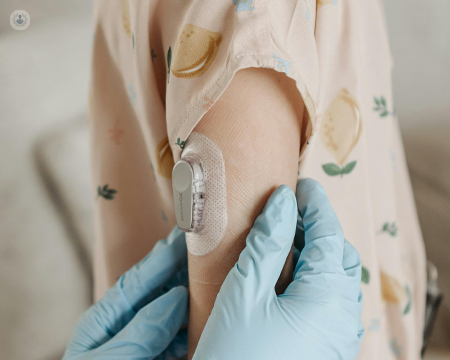Use of technologies for type 1 diabetes in children
Written in association with:Managing type 1 diabetes has evolved significantly with the integration of modern technologies, making life more manageable for patients by offering real-time insights and improved control over blood sugar levels. These advancements have shifted diabetes care from manual calculations and insulin injections to automated, data-driven solutions, improving both safety and quality of life.

Continuous glucose monitoring (CGM)
One of the most impactful technologies for managing type 1 diabetes is continuous glucose monitoring (CGM). Unlike traditional finger-prick tests, CGM devices use sensors inserted just beneath the skin to track glucose levels in real-time. They provide ongoing glucose readings, alarms for low or high levels, and trends over time.
The benefits of CGM include:
- Early detection of hypoglycaemia: CGM devices alert users when their blood sugar is dropping, allowing them to take action before experiencing symptoms like dizziness or confusion.
- Improved HbA1c control: Continuous monitoring helps users make more informed decisions about insulin dosages, leading to better long-term glucose control and reduced complications.
- Data sharing: Many CGM devices allow data to be shared with healthcare providers or family members, offering additional layers of support.
Insulin pumps
Insulin pumps are another key technology used to manage type 1 diabetes. These small, wearable devices deliver insulin throughout the day via a catheter inserted under the skin. Insulin pumps allow for more precise control over insulin dosing, offering flexibility in how much and when insulin is administered.
Key advantages include:
- Customised insulin delivery: Pumps can be programmed to deliver insulin based on the user’s specific needs, mimicking the body’s natural insulin release. They can provide continuous insulin as well as bolus doses before meals.
- Ease of use: For many patients, insulin pumps reduce the need for frequent injections, making diabetes management more convenient and less painful.
- Integration with CGM: Some pumps now work in tandem with CGM devices, automatically adjusting insulin delivery based on real-time glucose readings. This creates a more hands-off approach, often referred to as a “closed-loop system” or artificial pancreas.
Smart insulin pens
For patients who prefer injections over pumps, smart insulin pens offer a technological upgrade. These pens track insulin doses and timing, which can be useful for preventing missed or duplicated doses. Some models connect to smartphone apps to offer additional insights into blood sugar patterns, meal timing and insulin needs.
Smartphone apps and diabetes management platforms
Diabetes management has also become more accessible through smartphone apps and digital platforms. These apps allow patients to track their blood sugar levels, food intake, exercise, and insulin doses in one place, offering detailed reports that help users understand their diabetes management more clearly.
Some apps are designed to sync with CGMs or insulin pumps, providing a comprehensive view of glucose trends and insulin needs. Key features of these apps include:
- Data analytics: By analysing patterns in glucose levels, these apps can offer personalised advice on managing blood sugar spikes or dips.
- Carbohydrate counting: Many apps provide tools for tracking carbohydrates, making it easier to adjust insulin doses based on meals.
- Remote consultations: Some platforms allow for virtual consultations with healthcare providers, ensuring ongoing support and adjustments to treatment plans.
Artificial pancreas systems
One of the most promising advancements in the management of type 1 diabetes is the artificial pancreas system. This technology combines a CGM, insulin pump, and algorithm-driven software to automate insulin delivery. By continuously monitoring glucose levels and adjusting insulin doses accordingly, the artificial pancreas mimics the body’s natural glucose regulation, significantly reducing the burden on the patient.
Future developments
The future of diabetes care looks promising. Researchers are working on improvements like non-invasive glucose monitoring (through sweat or tears), implantable insulin delivery systems, and further refinement of the artificial pancreas. Such developments could one day make managing type 1 diabetes even more seamless and less intrusive.
The use of technologies for type 1 diabetes has revolutionised patient care, offering better blood sugar control, fewer complications, and more freedom in daily life. As these technologies continue to evolve, they provide an ever-growing toolkit for managing the complex challenges of type 1 diabetes.


